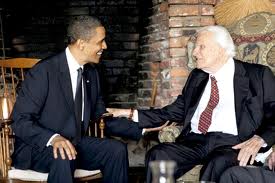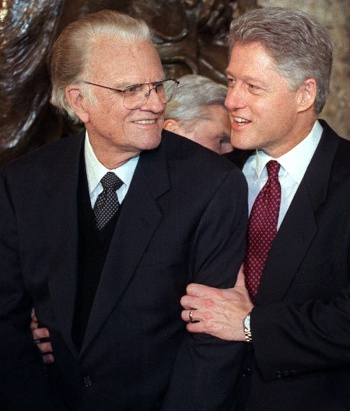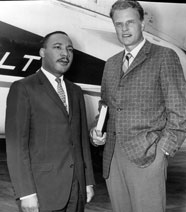When I first met Billy Graham in 1979, liberals were still troubled by his association with conservative candidates and their most recent standard-bearer, Richard Nixon. Yet as I discovered when writing Billy Graham & Me, the famous preacher is beloved by both the left and the right, by Democrats as well as Republicans. And he regrets having strayed from the pulpit to enter the partisan political arena during his days as a Nixon supporter. 
"I think our main responsibility today is to pray for the president and to pray for those in authority, that God will give them wisdom," Graham told me at the time. "What if two men were running for president," I asked him, "and one was obviously more learned and qualified, but the other was a very devout Christian. Which one would you endorse?" Graham's answer reaffirmed his belief in American democracy. "I'd pick the experienced and confident one," he said. "I don't think that we should vote for a person just simply because he says he's a Christian. I think we need confident men of integrity in places of responsibility. We are living in a secular society. We have a separation of church and state in this country."
Many folks assume that Billy Graham is a right-wing ideologue because he shares many of the most literal interpretations of the Bible espoused by Christian fundamentalists. But as an evangelical, his beliefs are more nuanced. "A lot of extreme fundamentalists think I'm too liberal in my sociological views," he told me, "and liberal people within the church are upset with me because of my conservative theology." Yet rather than alienating either of those groups, Graham was able to bridge the gaps among them. This is why I was able to gather such an interesting combination of stories for Billy Graham & Me.
There are inspiring firsthand anecdotes by self-declared atheists, devout Catholics, religious Jews, and secular progressives (don't worry, Bill O'Reilly is also in the book), all of them detailing the ways in which they have personally seen Graham act with compassion and humility. This diversity brought forth inspirational stories from Pat Robertson on the right and Al Gore on the left, the Catholic Tony Blair and the Jewish Larry King, the Hindu granddaughter of Mahatma Gandhi and the children of Johnny Cash.
Many Democrats were eager to write about Graham's dedication to social justice, which dates back to the earliest days of the civil rights movement. Both Presidents Clinton and Carter told stories that highlighted Graham's role in helping to end racial segregation. He had insisted that his events always be presented to an integrated audience, even in such hotbeds of segregation like Sumter County, Georgia. "Andy Young and the Reverend Martin Luther King, Jr. both said that Sumter County was the worst place in the United States to be put in jail," Carter remembered. Graham "helped integrate our county in a major way."
Graham had even invited the lesser-known Martin Luther King, Jr. to speak at his 1957 New York Crusade, a daring step for a preacher whose ministry was rooted in the segregationist South. The conservative columnist, Cal Thomas, wrote about a conversation that Graham had with King. "I know you can't go out on the streets because you have a unique ministry," King said to Graham, "so you take the churches and I'll take the streets." 
Congressman John Lewis, the civil rights icon who was brutalized during the 1965 freedom march in Selma, tells of his visit to Graham's home. "I had met the Pope and the Dalai Lama, but to meet Billy Graham and to talk with him was even more of a blessing because I felt a deeply personal spiritual connection," Lewis said. "You see, Billy Graham and I grew up in the same region of the country. We come from the same material, the same part of the world. We saw people divided by race and color, and we lived to see unbelievable changes."
One of my favorite stories is told by James Robison, the conservative Texas televangelist. "When it came to theology, I was always confrontational," Robison admits. "I was often too harsh and angry," he explains. Eventually, he took his tough talk to Billy Graham. "How can you associate with all these different people who, in my opinion, have some theological beliefs that are just plain wrong?" Robison challenged. "He asked me if I knew the people I was telling him to stay away from," Robison remembers. "When I replied that I did not, he simply said, 'I suggest you get to know the people you've been taught to avoid.' I then understood how wrong I was, how we can take our differences to such extremes. We don't have to compromise our beliefs, yet sometimes in defense of our faith, we compromise God's love. In the simplest way, Billy drove home the point that Jesus taught everything in the context of love -- for everyone."
When I asked Graham about the fate of those who do not share his faith, Graham's response affirmed this inclusiveness. "I don't try to play God, saying you're lost and you're saved," he told me. "That's between the person and God." Billy Graham had managed to achieve that rare balance of fierce conviction and humane humility. "I think we are told to proclaim Jesus Christ as the way, the truth, and the light, but God will decide who is saved and who is lost." He would not condemn. His mission was to comfort and inspire. When Graham learned that I was writing a book about him, he supported my effort yet not once did he or his staff ask me about my own religion. He trusts people, not just because of what they believe. Instead, he looks to see what's in their hearts.
Steve Posner teaches writing at the University of Southern California. Billy Graham & Me is his most recent book.